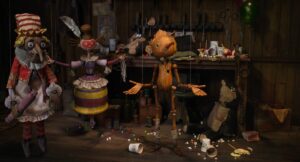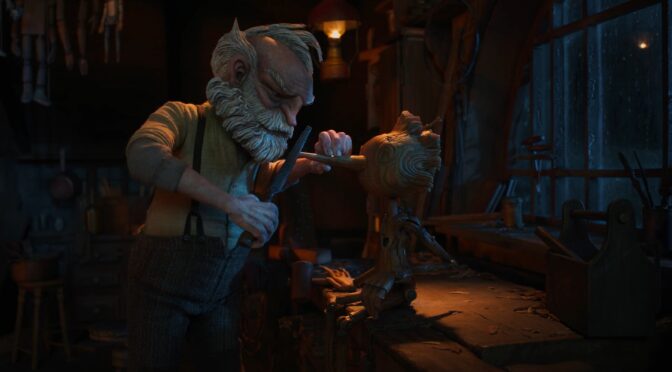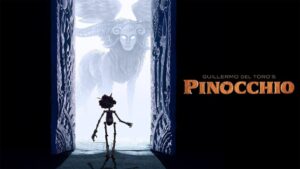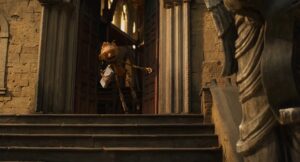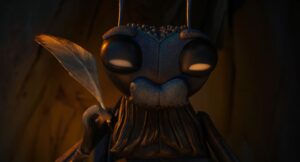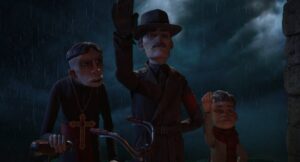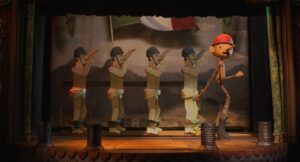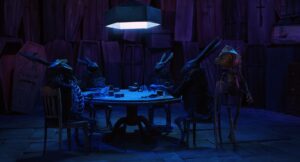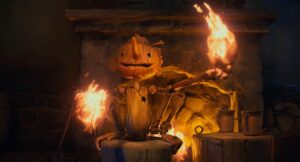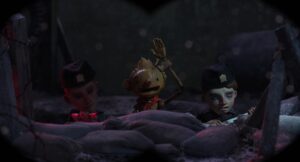Unlike my review last year for Peter Jackson’s Get Back, it would not be quite right to say that lovable Mexican cinema demigod Guillermo del Toto (the same man Peter Jackson replaced on those unfortunate Hobbit films) “came back” in 2022. For one thing, the man is only five years removed from his Best Picture and Director Oscars for Shape of Water, an admirably spirited and well-made film. Some of his other work over the last fifteen years may have fallen short of unqualified home run status and into the realm of beautifully crafted curios (Nightmare Alley, Crimson Peak), but let’s just be clear that those funky little baubles still display a sense of love and imagination that put ninety-nine percent of cinema’s visual stylists to shame. So no, Guillermo del Toro hasn’t been lost in the woods the way Peter Jackson had been until recently. At worst, he’s just been over there in the next room, always following his muse and pouring his jolly film nerd soul into whatever struck his fancy (when he’s not generously and vociferously shouting out his fellow filmmakers). Let’s be frank. If I’ve had slight hesitations about del Toro’s 2010’s and early 2020’s output, it’s only been because I’ve seen him strike genius before. In 2006, I went to a theater in Los Angeles with my law school roommates to watch Pan’s Labyrinth, his ravishing Spanish fairytale about fascism, rebellion and imagination. My first viewing was a top twenty theatrical experience, a crowd oscillating in unison between tearful hush, enchanted delight and audible tension. I’ve been to a lot of down-the-middle crowdpleasers, but I may never hear a crowd erupt more cathartically than the moment Maribel Verdu’s courageous housekeeper narrowly escapes torture at the hands of Sergi Lopez’s vile Captain Vidal, using her switchblade to carve a permanent sneer into his hateful face. And one should not not hold a director’s masterpiece against their other very good works. But, in truth, I have waited for Guillermo del Toro to make something like that again; that soulfully coherent and powerful. My wait came to an end in 2022 in the unlikely form of the man’s first animated film (along with his animator co-director Mark Gustafson), Guillermo del Toro’s Pinocchio. His now-Oscar-winning stop motion marvel finds the humble, spirited creative clearing his throat and drawing in his breath to bellow out another classic. With his sweet bookworm demeanor and giddy enthusiasm for movie-watching, del Toro is always a delight to hear from and read about. But this latest gem feels fiery and personal in a way that even Shape of Water‘s most impassioned harangues against conformist bigotry didn’t for me. The gothic maestro is at the height of his powers again and ready to hold us rapt with attention once more.
The original seed for Pinocchio is not an old fairytale but an 1880s Italian novel by Italian author Carlo Collodi. Its most famous (and still best by my estimation) screen treatment is Walt Disney’s surprisingly unnerving and painterly animated masterpiece from 1940. In spite of its bracing darkness, the Disney version does not match the sheer Grimms Brothers-evoking macabreness of the novel, if only because Disney’s Pinocchio never bites a cartoon cat’s paw off nor later has that same cat try to hang him to death. It’s a high, fucked-up bar. Guillermo del Toro’s superb new spin on the tale as seen through the lens of 1930s fascist Italy is also a little less grisly than Collodi’s text though arguably no less morbid. The man who made fairy tale magic so spooky and tragic in Pan’s Labyrinth has made another tale suffused with death and tormented by human cruelty. Death strikes no more than fifteen minutes in when kindly village woodcarver Geppetto (a truly special voice performance by British national treasure David Bradley) loses his beloved 8-year old son Carlo (I choose to see this as Del Toro literally killing the story’s author) to an accidentally-dropped bomb. The devastated old man spends years in a spiral of grief. The crucifix he was carving in the local church hangs unfinished, a reminder to the whole village of his absence. The village buzzes with judgmental gossip. Geppetto falls into a drunken haze. One night, in the throes of a debilitating bender, he chops down a pine tree (one that Carlo had planted prior to his death) and crudely carves the titular puppet out of it. This display of anguish earns the attention of a cricket named Sebastian, who has just moved into a hole in the tree’s trunk when it is suddenly, rudely chopped down. Geppetto’s loud sobs also earn the sympathy of some forest spirits, who take a peculiar kind of pity on the bereaved father by bringing his alarmingly rough, alcohol-inspired artwork to life. Unlike Disney’s Geppetto, this version doesn’t wake up grateful and moved to find a son he never had. This one awakens mortified to find a piney abomination clumsily breaking objects, singing loudly and calling him Papa. “I’m not your Papa!,” the old man yells with revulsion. The villagers are even more up in arms when the unruly, possessed plaything claiming to be a young boy storms into the church, causes a supernatural commotion and tries to pose like the wooden colleague on the cross above him. 2022 was a great year for wild plot twists and Geppetto’s initial gobsmacked reluctance to having a relationship with his ersatz son is only the beginning of the twists del Toro applies to this oft-told tale. The local fascists, notably the village priest and the leader of the local fascist party (voiced by del Toro regular Ron Perlman) quickly abandon the idea of drumming Pinocchio out of town and instead try to rein him into conformity with their own norms and plans. Pinocchio is ordered to attend school and become an upstanding citizen. And when, as in the Disney version, he is lured into a seedy life of show business by a traveling puppeteer (an effective Christoph Waltz, though I think Paul Giamatti would have eaten this role alive), the next course proposed is that he join Mussolini’s youth army (certainly not in the Disney version or in Colucci’s novel). This idea becomes especially intriguing to the local fascist hood when Pinocchio is run over by a truck and comes back to life no more than an hour later. If there’s one thing a Nazi loves more than a naive young mind, it’s a naive young mind that is impervious to death. It’s so nice to have Guillermo del Toro back in anti-fascist fairy tale mode. It’s a micro-genre that has sorely missed him while he was away.
On the strength of Pinocchio and Pan’s Labyrinth, del Toro’s understanding of fascism could not be more sharp and multi-hued. It is not merely the violence and debasement at its core that he grasps. He is not simply out to snipe at its oppressive vileness. As brilliant an avatar of spiteful evil as Captain Vidal was in Pan’s Labyrinth, he was only authoritarianism’s most dominant face. One of the ingenious twists of that film was how its heroine had to do more than thwart this obviously fascistic villain. When the seemingly benevolent Faun whose instructions she has been dutifully obeying (in the name of disobeying an evil man of course) asks for a drop of her infant brother’s blood as the final step in her quest, she realizes she cannot heed this demand, even if it is nominally in pursuit of a virtuous goal. She must see at last that fascism wears many masks, with the Captain being just one among them Fascism is not simply a barking demon. It can also take the form of arrogant buffoons, ineffectual stooges and even a friend who pressures us to turn a deaf ear to our own consciences. It can even take the form of a family member. The fascism of Pinocchio’s village is only partially a militaristic kind. It is just as much comprised of fearful citizens, dogmatic priests, judgmental bureaucrats and even disappointed fathers. There are systems of control that have no need for barbed wire and boots. In Guillermo del Toro’s Pinocchio, the lovable auteur wrestles with the burden of both being a father and having a father, with the voice in our heads that whispers there are some people we should obey reflexively. Maybe that voice comes from a good place and maybe we’re right to listen to it, but what about when the voice is wrong? Del Toro leaves the issue of how much obedience a child owes their parent bracingly unresolved. He simply observes that there is something very scoldingly parental in the nature of fascism. Fascist governments are like toxically stern parents who reduce their subjects to the status of perpetually grounded children. A fascist nation abuses its people and then metes out guilt-ridden punishment if they dare to question that abuse. Mussolini and Hitler did not refer to their kingdoms as Fatherlands for nothing.
The middle sections of this Pinocchio are about the young puppet learning the right kind of loyalty, the right kind of selflessness. Not the sort rigidly demanded of us by some authority figure but the kind our consciences (which are sometimes harried, aspiring novelist crickets) compel us towards. The beginning and conclusion of del Toro’s film are lovely, wise bookends about grief and mortality. The prologue that leads up to Pinocchio’s grief-addled creation was not part of Collodi’s novel. Geppetto’ s tragic loss is a conceit added whole cloth by Guillermo del Toro and it considerably deepens this story of a being that can only dream of being a flesh and blood human being. This version of the story posits dying (read: staying dead) as the most human thing of all. Before he becomes an anti-fascist icon, we first meet Pinocchio as a hysterically unholy torment to his creator. A motormouthed mockery of an old man’s grief and a cutting reminder of the folly of trying to outmaneuver death. In that sense, this Pinocchio’s off-putting roughness is both wryly funny and poignant. As if to remind Geppetto how very much this is not his dead son, Pinocchio looks less like a wooden little boy and more like something you would see in a child-friendly version of John Carpenter’s The Thing. Pinocchio’s entrance and early scenes are so sharply discomfiting that I momentarily questioned if this version of the character would even have any kind of redemptive or life-affirming arc. For a matter of minutes, Guillermo del Toro feints toward this being a story about how alcohol and the spirit world conspire to rub the inevitability and permanence of loss in a kindly woodcarver’s face. Those early scenes of Pinocchio as an uncomprehending little terror are also hands down the funniest that del Toro has ever written. And while this epilogue and coda may seem mostly separate from the film’s ruminations on fascism, I think all of these themes speak to our messy humanity. How our fear and our ignorance and our sadness and our powerlessness over death are all primal forces that we are swept along by. They are the things that lead us by the nose more often than not and that is a very relatably human thing. I don’t think Guillermo del Toro’s Pinocchio offers a bright line moral here, so much as it offers a prayer for our emotional endurance. A hope that, while we cannot be free of that complicated, vulnerable swirl inside of us, we can find a way to be more than the unthinking product of it. From time to time at least. Finding your courage and yourself in the maelstrom is what makes you a real boy or girl.
With all there is to love about del Toro’s remarkable first foray into animation (from the stunning detail of its stop motion work to its potent voice performances), I’m maybe most impressed by what a singular and personal work of adaptation it is. If the directors of 2022 were contestants on an old season of American Idol, Guillermo del Toro would be the director most likely to have Paula Abdul gushing, “You made it your own!” There’s nothing wrong with adapting a source material faithfully and subtly, but del Toro’s dramatic deviations are almost all perfectly judged (I don’t know that this absolutely needed to be a musical but I think most of its songs are perfectly good). The airlift form the 1880’s to 1930’s Italy sets up its fascist themes and gives the animators a wealth of beautiful period detail to play with. The addition of Carlo and his tragic death gives a broad children’s fable character dpeth and specificity in a way that never interferes with the story’s fairy tale tone. And the details involving Pinocchio’s multiple not-quite-deaths and his repeated journeys through a hilariously bureaucratic underworld (del Toro bemusedly suggests that maybe humans don’t have a copyright on tedious protocol) are delightfully sardonic. Guillermo del Toro’s Pinocchio is what happens when a creator is inspired by a work of art but not bound to it. It’s a testament to the value of not simply memorizing your source but really understanding it. Guillermo del Toro sees what has made Pinocchio endure and then, like any great artist taking a crack at a frequently covered chestnut, he offers some insights of his own that you might not have considered before. Sometimes he plays along with Collodi’s already-eccentric story and sometimes he runs away from it and around it in circles like a giggly schoolboy. IN a film about defiance as the very best human trait, del Toro leads by example. He clearly has the greatest of respect and affection for the old tale he is adapting. But he loves it because of what it makes him think of, and he’s too vivacious and uninhibited a filmmaker to stay in its shadow. To truly honor someone you respect, be it a father or a fellow artist, you need to have the courage to be yourself.
Is Guillermo del Toro funny? I said it before but it bears repeating that his Pinocchio is genuinely a very funny film. I was surprised by its humor, though maybe it was unfair of me to assume that it wouldn’t have that. Guillermo del Toro does have the two Hellboy films, which rely a lot on jokes. Then again, I found Shape of Water‘s attempts at being funny to be somewhat off. Not in an entirely ineffectualy way, but clumsy enough to make me wonder why this movie was trying to make me laugh. Whimsy fit Shape of Water very well, as it fits del Toro himself, but the jokes (about weird repressed 1950’s sex and Chiclets and generals yelling “unfuck this mess”) felt more shoehorned in. But I laughed heartily at Guillermo del Toro’s Pinocchio, enough so that I feel I owe the ticklishly sweet man more credit as a humorist. Jokes may not be what I come to his films for, but what I do come for is to bear witness to his exuberant id. and if Guillermo del Toro needs some jokes to really put the finishing touches on his latest Chex mix of eeriness, sentiment, rebel attitude and note-perfect effects, then that’s what he needs. Artists as wildly imaginative as him are always going to be given to wild indulgences and it’s a given that not all of them will connect with me. But Guillermo del Toro’s Pinocchio is a blessed reminder of why the man is such an undeniable force for good in filmdom. Because, when all of his flourishes and flights of fancy lock into place, there’s just nobody on the planet (don’t you even think about saying Tim Burton to me) like him. And when not everything is gelling seamlessly, there’s still nobody on the planet like him (not even Tim Burton). He’s a man so endearingly, irrepressibly himself that his film about fish sex and red scare politics cruised to Oscar glory and just about everyone was tickled to watch it happen. So not, it wouldn’t be accurate to say that Guillermo del Toro came back in 2022. If anything, I came back to him. Like a prodigal son coming home to cinema’s most gregarious, free-wheeling and generous father.